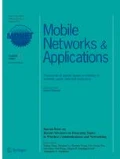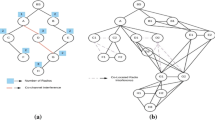Abstract
Interference has strong effect on the available bandwidth of wireless local area network (WLAN) based mesh networks. The channel assignment problem for multi-radio multi-channel multihop WLAN mesh networks is complex NP-hard, and channel assignment, routing and power control are tightly coupled. To mitigate the co-channel interference and improve capacity in multi-channel and multi-interface WLAN mesh networks, a power-efficient spatial reusable channel assignment scheme is proposed, which considers both channel diversity and spatial reusability to reduce co-channel interference by joint adjusting channel, transmission power and routing. In order to assign channel appropriately, an efficient power control scheme and a simple heuristic algorithm is introduced to achieve this objective, which adjust the channel and power level of each radio according to the current channel conditions so as to increase the opportunity of channel spatial reusability. The proposed channel assignment scheme also takes load, capacity and interference of links into consideration. Simulation results show the effectiveness of our approach and demonstrate that the proposed scheme can get better performance than other approaches in terms of throughput, blocking ratio, energy consumption and end-to-end delay.








Similar content being viewed by others
References
Xie J, Wang X (2008) A survey of mobility management in hybrid wireless mesh networks. IEEE Netw 22(6):34–40
Hiertz GR, Denteneer D, Max S, Taori R, Cardona J, Berlemann L, Walke B (2010) IEEE 802.11s: the WLAN mesh standard. IEEE Wirel Commun 17(1):104–111
IEEE Std. 802.11-1999 (1999) PART 11: Wireless LAN Medium Access Control (MAC) and Physical Layer (PHY) specifications. Reference number ISO/IEC8802-11:1999(E), IEEE Std.802.11
Faccin SM, Wijting C, Kneck J (2006) Mesh WLAN Networks: concept and system design. IEEE Wirel Commun 13(2):10–17
Bansal D, Sofat S (2010) Deployment and evaluation of IEEE 802.11 based wireless mesh networks in campus environment. In: The 4th ACM workshop on networked systems for developing regions (NSDR’10)
Kandhalu A, Rowe A, Rajkumar R, Huang C, Yeh C-C (2009) Real-time video surveillance over IEEE 802.11 mesh networks. In: 15th IEEE real-time and embedded technology and applications symposium (RTAS 2009), pp 205–214
Eddie Law KL, Hung W-C (2010) MAC design for interference issues in multi-channel wireless mesh networks. IEEE International Conference on Communications (ICC 2010)
Loyola L, Kumagai T, Nagata K, Otsuki S, Aikawa S (2007) A new multi-channel mesh architecture with DCF-based inter-AP communication and radio-aware packet forwarding for IEEE 802.11-compliant WLANs. IEICE Trans Commun E90-B(1):78–91
Liu T, Liao W, Lee J-F (2009) Distributed contention-aware call admission control for IEEE 802.11 multi-radio multi-rate multi-channel wireless mesh networks. Mobile Networks and Applications 14(2):134–142
Nguyen HL, Nguyen UT (2008) Minimum interference channel assignment for multicast in multi-radio wireless mesh networks. In: Proceedings of the international wireless communications and mobile computing conference 2008, pp 626–631
Bruno R, Nurchis M (2010) Survey on diversity-based routing in wireless mesh networks: challenges and solutions. Comput Commun 33(3):269–282
Capone A, Carello G, Filippini I, Gualandi S, Malucelli F (2010) Routing, scheduling and channel assignment in wireless mesh networks: optimization models and algorithms. Ad Hoc Networks 8(6):545–563
Tang J, Xue G, Zhang W (2005) Interference aware topology control and QoS routing in multi-channel wireless mesh networks. In: 6th ACM international symposium on mobile ad hoc networking and computing (Mobihoc 2005), pp 68–77
Wu H, Yang F, Tan K, Chen J, Zhang Q, Zhang Z (2006) Distributed Channel Assignment and Routing in Multi-radio Multi-channel Multi-hop Wireless Networks. IEEE J Sel Areas Commun 24(11):1972–1983
Wang W, Liu X, Krishnaswamy D (2009) Robust routing and scheduling in wireless mesh networks under dynamic traffic conditions. IEEE Trans Mob Comput 8(12):1705–1717
The Network Simulator - ns-2. Available online http://www.isi.edu/nsnam/ns/
Acknowledgements
This work was supported by the National Natural Science Foundation of China (No. 60902053), and the Natural Science Foundation of Hubei Province (No. 2008CDB339). The authors also gratefully acknowledge the helpful comments and suggestions of the reviewers.
Author information
Authors and Affiliations
Corresponding author
Rights and permissions
About this article
Cite this article
Zhu, R., Wang, J. Power-Efficient Spatial Reusable Channel Assignment Scheme in WLAN Mesh Networks. Mobile Netw Appl 17, 53–63 (2012). https://doi.org/10.1007/s11036-011-0302-x
Published:
Issue Date:
DOI: https://doi.org/10.1007/s11036-011-0302-x




